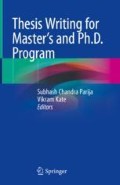Abstract
-
It is the responsibility of the writer to acknowledge a source, context and genres of their writing.
-
Plagiarism can destroy the self and academic reputation of an author.
-
Copyright violation is not the same as plagiarism, though both are closely related.
-
Copyright protects and rewards the creativity of the original author. Legal action can be taken by the owner against anyone who engages in infringement of the copyright of his/her own work.
-
Conflict of interest is important in any research work because it can interfere with trustworthiness of a researcher’s judgement
-
Consent can be either implied consent or expressed consent. It is necessary for photographing, revealing the identity of the patient while publishing and enrolling patients for clinical trial and research project
He who receives an idea from me, receives instruction himself without lessening mine; as he who lights his taper at mine, receives light without darkening me.—Thomas Jefferson

Access this chapter
Tax calculation will be finalised at checkout
Purchases are for personal use only
References
Das N, Panjabi M. Plagiarism: why is it such a big issue for medical writers? Perspect Clin Res. 2011;2(2):67–71. https://doi.org/10.4103/2229-3485.80370.
Flowcharts. Committee on Publication Ethics. Available from http://publicationethics.org/resources/flowcharts.
Lands R. Plagiarism is no crime published by the association of illustrators (AOI). Quotation: Plagiarism may be a taboo in academia, but in art is almost essential; 1999.
Badke W. Training plagiarism detectives: the law and order approach. Online. 2007;31(6):50–2.
Brehm AS. Defendants in idea submission claims are increasingly winning summary judgment by demonstrating independent creation. Los Angeles Lawyer. 2010;33:28.
The Copyright Act 1957. Accessed from http://copyright.gov.in/documents/copyrightrules1957.pdf.
The Information Technology Act, 2000. Accessed from-http://www.dot.gov.in/sites/default/files/itbill2000_0.pdf.
Lo B, Field MJ, editors. Conflict of Interest in Medical Research, Education, and Practice. Washington (DC): National Academies Press US; 2009. Available from: http://www.ncbi.nlm.nih.gov/books/NBK22942/
Wakefield A, Murch S, Anthony A, Linnell J, Casson DM, Malik M, et al. Ileal-lymphoid-nodular hyperplasia, non-specific colitis, and pervasive developmental disorder in children. Lancet. 1998;351(9103):637–41. Retracted 05–09-2007
Flaherty DK. The vaccine-autism connection: a public health crisis caused by unethical medical practices and fraudulent science. Ann Pharmacother. 2011;45(10):1302–4.
Wang AT, Mc Coy CP, Murad MH, Montori VM. Association between industry affiliation and position on cardiovascular risk with rosiglitazone: cross sectional systematic review. BMJ. 2010;340:c1344.
Ghooi RB. Conflict of interest in clinical research. Perspect Clin Res. 2015;6(1):10–4. https://doi.org/10.4103/2229-3485.148794.
Privacy technical assistance center.US department of education. Available from: http://ptac.ed.gov/.
Satyanarayana Rao KH. Informed consent: an ethical obligation or legal compulsion? J Cutan Aesthet Surg. 2008;1(1):33–5. https://doi.org/10.4103/0974-2077.41159.
Beauchamp TL, Childress JF. Principles of biomedical ethics. 5th ed. Oxford: Oxford University Press; 2001.
Madhava Menon NR. Medical ethics and health care - issues and perspectives. Karnataka Med J. 2000;71:2–9.
Joga Rao SV. Medical Ethics, A Ready Referencer. 1st ed. Bangalore: Legalaxy Publications; 2004. p. 84.
Medical Ethics Manual. World Medical Association, Inc. 2005. p. 105. Available from: http://www.wma.net/.
Gupta UC. Informed consent in clinical research: revisiting few concepts and areas. Perspect Clin Res. 2013;4(1):26–32. https://doi.org/10.4103/2229-3485.106373.
Acknowledgments
Acknowledgement is a gesture that allows us to thank all the individuals who helped to make the project a successful one. A standard pattern for writing an acknowledgement letter has not been described. In thesis, a single page usually following the contents page is allotted for acknowledgement. The investigator mentions gratitude to the individuals who helped in the research in order of their importance. The usual format includes acknowledging the guide and co- guides, followed by other faculty in the department in order of seniority. This is then followed by acknowledging the administrators of the institute for facilitating the research. The colleagues, family members and the involved patients are then acknowledged. The rendering must be concise and without emotion. However, when the thesis is converted to a manuscript for publication, acknowledgemnt as two to three concise statements is included at the end of manuscript, before the references. This will include acknowledgements for the funding sources if any and to other contributors to the study who, however, doesn’t satisfy the authorship criteria. All the contributors to the project need not be co-authors and in such circumstances the statement of acknowledgement becomes a polite gesture of recognising their assistance. It is common practise in many institutions to provide a copy of the completed research project to the contributors. Acknowledgements boost researcher morale and promote further cooperation especially when one or more of the contributors do not receive authorship.
Author information
Authors and Affiliations
Editor information
Editors and Affiliations
Rights and permissions
Copyright information
© 2018 Springer Nature Singapore Pte Ltd.
About this chapter
Cite this chapter
Ravindran, M.K., Zacharia, B., Roy, A. (2018). Plagiarism and Copyright, Acknowledgements, Disclosure and Conflicts of Interest. In: Parija, S., Kate, V. (eds) Thesis Writing for Master's and Ph.D. Program. Springer, Singapore. https://doi.org/10.1007/978-981-13-0890-1_19
Download citation
DOI: https://doi.org/10.1007/978-981-13-0890-1_19
Published:
Publisher Name: Springer, Singapore
Print ISBN: 978-981-13-0889-5
Online ISBN: 978-981-13-0890-1
eBook Packages: MedicineMedicine (R0)


